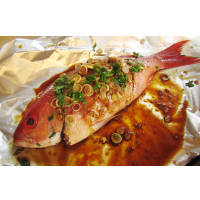One-Third of Fish Sold as Food are Mislabeled…and Watch out for Sushi Bars
 Red snapper?
Red snapper?
Seafood cuisine is proving to be quite fishy—for the wrong reason.
A study by the nonprofit ocean protection group, Oceana, found that about one-third of the 1,215 fish samples bought over a two-year period (2010-2012) were mislabeled.
The samples were collected from 674 restaurants, markets and sushi bars in 21 states. The sushi bars proved to be the most misleading in terms of which fish were being sold to customers, with 74% mislabeled.
Nationally, 87% fish sold as snapper weren’t snapper and when it came to red snapper, only 7 of 120 samples were actually red snapper. Tuna fared little better with only 59% of alleged tuna being real tuna. In New York, tuna was almost never tuna according to Oceana, which found 94% of samples to be some other kind of fish.
According to the Oceana report, “Seafood substitutions included species carrying health advisories (e.g. king mackerel sold as grouper; escolar sold as white tuna), cheaper farmed fish sold as wild (e.g. tilapia sold as red snapper), and overfished, imperiled or vulnerable species sold as more sustainable catch (e.g. Atlantic halibut sold as Pacific halibut).
-David Wallechinsky, Noel Brinkerhoff
To Learn More:
Oceana Study Reveals Seafood Fraud Nationwide (by Kimberly Warner, Walker Timme, Beth Lowell and Michael Hirshfield, Oceana) (pdf)
Survey Finds That Fish Are Often Not What Label Says (by Kirk Johnson, New York Times)
Think You’re Eating White Tuna Because the Menu Says So? Think Again (by Noel Brinkerhoff and David Wallechinsky, AllGov)
- Top Stories
- Unusual News
- Where is the Money Going?
- Controversies
- U.S. and the World
- Appointments and Resignations
- Latest News
- Musk and Trump Fire Members of Congress
- Trump Calls for Violent Street Demonstrations Against Himself
- Trump Changes Name of Republican Party
- The 2024 Election By the Numbers
- Bashar al-Assad—The Fall of a Rabid AntiSemite






Comments